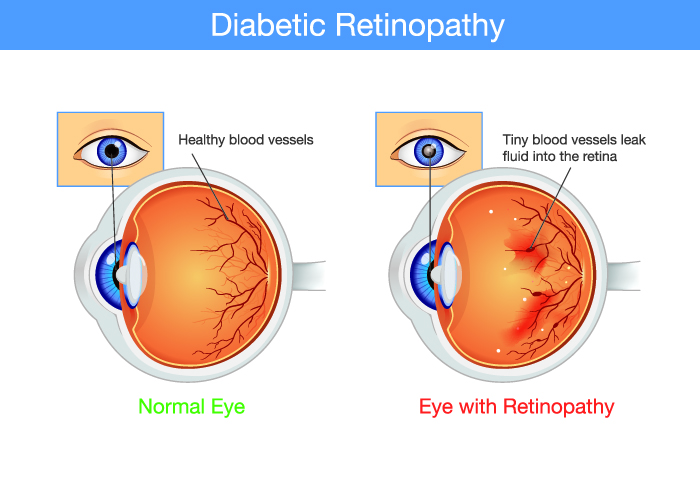Diabetic Retinopathy Treatment in Alwarpet, Chennai
Diabetic retinopathy is a diabetic complication that affects your eyes. During the initial stages of diabetic retinopathy, you may experience mild symptoms or, sometimes, no symptoms at all. However, as the complication progresses, it can lead to blindness.
You can develop diabetic retinopathy if you have a long history of uncontrolled high blood sugar levels or either type I or type II diabetes.
To seek treatment, consult an ophthalmology doctor near you or an ophthalmology hospital near you.

What are the types of diabetic retinopathy?
The two common types of diabetic retinopathy are:
- Nonproliferative diabetic retinopathy (NPDR)
In this type of diabetic retinopathy, your eye does not make new blood vessels. The damaged blood vessels begin to leak fluid and blood into the eyes. In some cases, the macula, the center of the retina, starts to swell as well. This condition is known as macular edema. The three stages of nonproliferative diabetic retinopathy are mild, moderate and severe. The third type may progress to a fourth stage, known as proliferative diabetic retinopathy. - Proliferative diabetic retinopathy (PDR)
Proliferative diabetic retinopathy is the fourth stage of diabetic retinopathy, where new blood vessels begin to grow in your eye. More often, these new blood vessels are abnormal and grow in the center of your eye.
What are the symptoms of diabetic retinopathy?
During the initial stages of diabetic retinopathy, you may not experience any prominent symptoms. Once the complication starts to progress further and damage your eye, you may experience the following symptoms:
- Difficulty seeing at night
- Empty or dark areas in your vision
- Blurred vision
- Loss of vision
- Seeing floaters, dark strings or spots floating in your vision
- Difficulty distinguishing colors
- Fluctuating vision
When should you visit the doctor?
If you have diabetes, you are at a risk of developing diabetic retinopathy. Even if your vision seems fine, it is recommended that you visit your doctor for yearly eye checkups.
In some cases, pregnancy worsens diabetic retinopathy. If you are pregnant, regularly visit your eye doctor to make sure there are no complications with you or your baby.
If you experience blurry, hazy or spotty vision without a possible explanation, contact your doctor right away.
Request an appointment at Apollo Spectra Hospitals, Alwarpet, Chennai.
Call 1860 500 2244 to book an appointment.
What are the causes of diabetic retinopathy?
The main cause of diabetic retinopathy is a high sugar level in your blood for a prolonged period of time. Excess blood sugar damages the vessels that supply blood to your eyes. High blood pressure is known to be another cause of diabetic retinopathy.
The retina is a tissue layer located at the back of your eye. Its responsibility is to change the images you see into nerve signals for your brain to understand. When the blood vessels connecting to your retina get damaged, they can be blocked and eventually cut off the blood supply to the retina. The loss of blood flow can cause the development of weaker blood vessels in the eye, which can leak, causing a loss of vision.
The longer you have diabetes, the higher are your chances of developing diabetic retinopathy. Most people who have diabetes for more than 30 years show mild symptoms of diabetic retinopathy.
What are the treatment options for diabetic retinopathy?
Upon carefully diagnosing the type of your diabetic retinopathy and its severity, your doctor will devise a treatment plan for you.
Nonproliferative diabetic retinopathy
If you have mild diabetic retinopathy, you may not need treatment right away. However, your doctor will closely monitor your eyes to ensure that the complication does not progress.
Proliferative diabetic retinopathy
If you develop advanced retinopathy, your doctor might prescribe prompt treatment. The standard treatment options include:
- Photocoagulation
To stop or slow down the leakage of blood and fluid in your eyes, the doctor may recommend focal laser treatment. During this procedure, the doctor will treat the leaks from the blood vessel using laser burns. - Panretinal photocoagulation
This type of laser treatment, also known as scatter laser treatment, aims at shrinking the abnormal blood vessels. During this procedure, the doctor will treat the area in the retina with scattered laser burns, thereby shrinking the blood vessels.
Conclusion
Diabetic retinopathy is a severe diabetic complication that can affect your ability to see. If not treated on time, it can lead to blindness. This is why it is essential that you visit your doctor as soon as you start experiencing diabetic retinopathy symptoms.
Keeping the following factors in check can help prevent diabetic retinopathy:
- Cholesterol
- Blood sugar
- Blood pressure
Usually, it takes several years for diabetic retinopathy to reach a stage that can cause blindness.
There is no cure for diabetes or diabetic retinopathy yet. However, with the right course of treatment and preventive measures, symptoms can be reduced.
Symptoms
Our Doctors
DR. M SOUNDARAM
MBBS, MS, FCAEH...
| Experience | : | 8 Yeras Experience |
|---|---|---|
| Speciality | : | Ophthalmology... | Location | : | Alwarpet |
| Timings | : | Available by prior a... |
DR. UMA RAMESH
MBBS, DOMS, FRCS...
| Experience | : | 33 Yeras Experience |
|---|---|---|
| Speciality | : | Ophthalmology... | Location | : | Alwarpet |
| Timings | : | Sat : 12:00 PM to 1:... |
DR. MANOJ SUBHASH KHATRI
MBBS, DO, DNB, FICO(...
| Experience | : | 15 Yeras Experience |
|---|---|---|
| Speciality | : | Ophthalmology... | Location | : | Alwarpet |
| Timings | : | Available by prior a... |
DR. SRIPRIYA SANKAR
MBBS, Madras Medical...
| Experience | : | 30 Yeras Experience |
|---|---|---|
| Speciality | : | Ophthalmology... | Location | : | Alwarpet |
| Timings | : | Tue, Thur: 05:00 PM ... |
DR. PRATIK RANJAN SEN
MBBS, MS, DO...
| Experience | : | 23 Yeras Experience |
|---|---|---|
| Speciality | : | Ophthalmology... | Location | : | Alwarpet |
| Timings | : | ON CALL... |
DR. MEENAKSHI PANDE
MBBS, DO, FRCS...
| Experience | : | 27 Yeras Experience |
|---|---|---|
| Speciality | : | Ophthalmology... | Location | : | Alwarpet |
| Timings | : | Available on prior a... |
DR. ASHOK RANGARAJAN
MBBS, MS (OPHTHAL), ...
| Experience | : | 20 Yeras Experience |
|---|---|---|
| Speciality | : | Ophthalmology... | Location | : | Alwarpet |
| Timings | : | Mon, Wed, Fri : 6:00... |
DR. SAPNA K MARDI
MBBS, DNB (Opthal)...
| Experience | : | 30 Yeras Experience |
|---|---|---|
| Speciality | : | Ophthalmology... | Location | : | Alwarpet |
| Timings | : | Tue, Thur : 10:00 AM... |
DR. SRIKANTH RAMASUBRAMANIAN
MBBS, MS (Ophthal), ...
| Experience | : | 14 Yeras Experience |
|---|---|---|
| Speciality | : | Ophthalmology... | Location | : | Alwarpet |
| Timings | : | Mon, Wed, Fri | 10... |
Our Top Specialities
NOTICE BOARD
CONTACT US
CONTACT US
 Book Appointment
Book Appointment











.svg)
.svg)
.svg)
.svg)








